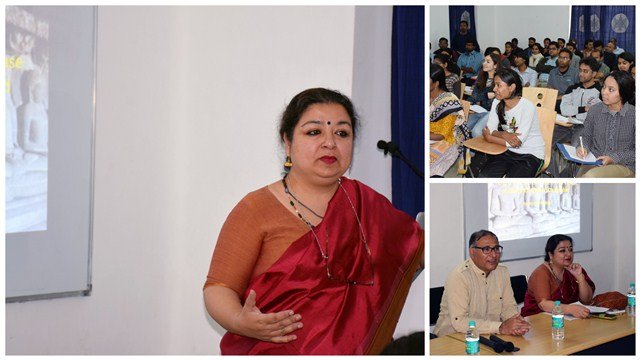SEES Weekly Lecture: Water and Sacred Spaces-A Case Study of the Ellora-Khuldabad-Daulatabad Region
February 13, 2017
Dr. Yaaminey Mubayi, Visiting Faculty at School of Planning and Architecture delivered a lecture titled “Water and Sacred Spaces: A Case Study of the Ellora-Khuldabad-Daulatabad Region,” in the SEES Weekly Lecture series on February 10, 2017.
In this lecture Dr. Mubayi presented a unique perspective to the study of water and human history. By focusing on a historically settled and culturally active region of South Asia, i.e. Ellora-Khuldabad-Daulatabad in the Marathwada region of the Indian Deccan Plateau, her talk sought to examine the ecological features of the region as underpinning the historical and cultural development of the political, socio-economic and cultural systems intrinsic to the area.
This area within a 10 km radius in Aurangabad district, is richly populated by historic sites such as the Ellora Cave complex, a UNESCO World Heritage Site and Daulatabad Fort besides numerous smaller temples, pilgrimage centres, ashrams, Sufi dargahs and historic tanks (kunds). The theme for the region is set by the numerous water features, streams, rivulets, man-made reservoirs, temple tanks and historic state-sponsored waterworks. The micro-watershed of Khuldabad Taluka, within which the study area is located, provides an appropriate context for the evolution of human settlements in the region since pre-historic times.
Dr. Mubayi talked about how water, an essential resource for the evolution of human settlements throughout history, has thus far escaped the attention of scholars of history in South Asia. She shared that contemporary research on water is largely on the examination of policy frameworks governing access to and distribution of water resources on the one hand, as well as fixating on the colonial period as a “watershed” dividing pre-modern water management systems from colonial and post-colonial policies seeking to control the use of water by communities.

Dr. Mubayi, Historian, Social Development Professional and Visiting Faculty at School of Planning and Architecture, delivering a lecture at Nalanda University
Bio-Sketch of Dr. Yaaminey Mubayi
Dr. Mubayi is a Historian and Social Development Professional with twenty years of experience in the field of Cultural Heritage Studies. With an interest in fieldwork-based applied to learn as her core motivation, she has combined research and institutional experience with academic practice and forged an innovative professional niche in the area of Cultural Heritage and Development Planning. Dr. Mubayi completed her Undergraduate degree in South Asian Studies from Mount Holyoke College, Massachusetts, the USA, and her Masters, M.Phil and Ph.D. in History from Jawaharlal Nehru University, New Delhi. She has specialized in the niche sector of Cultural Heritage where her skills and training in the disciplines of History, as well as Development, have been utilized. She is currently teaching at the Department of Conservation Studies, School of Planning and Architecture, Delhi and the BML Munjal University, Gurgaon. She has worked with a number of organizations including international multi-laterals like UNESCO, the World Bank and ADB, private sector foundations and state and central government bodies like the Archaeological Survey of India and Ministry of Culture, Government of India. Her work in these organizations has primarily involved policy, planning and advisory initiatives related to community development, local history, and oral traditions.